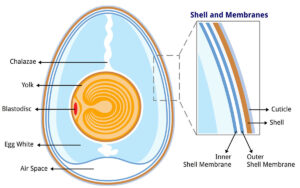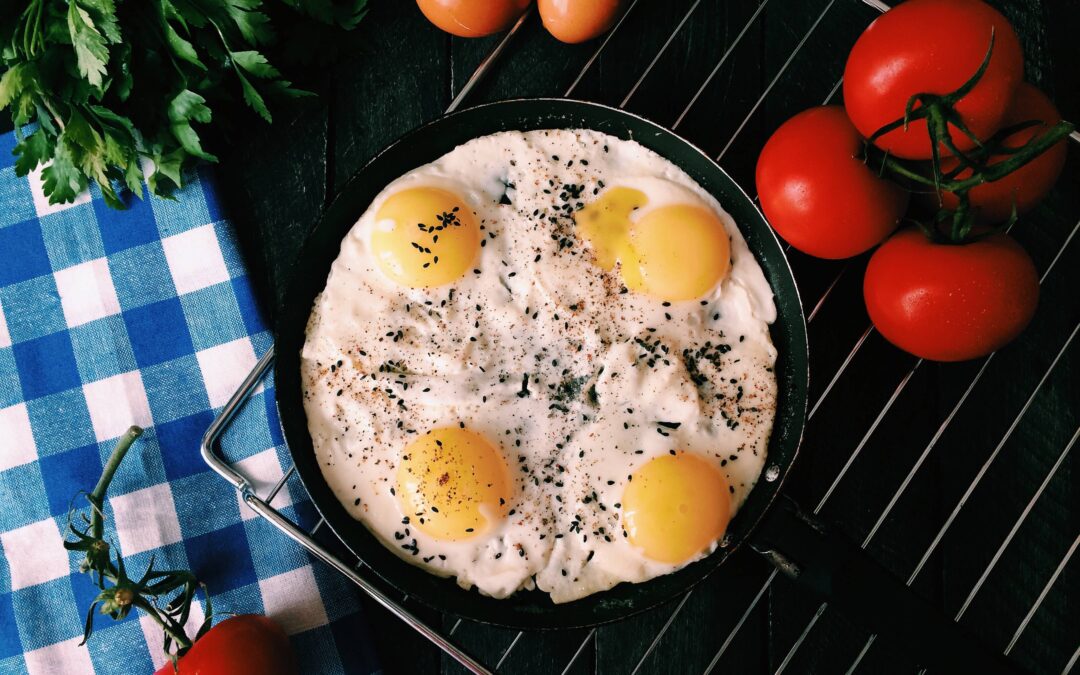While most foods are pretty versatile in the ways we can prepare them, few are as versatile as eggs. From scrambled to sunny side up, baked into a cake, a soufflé, or even eaten raw, there’s no denying that there’s few foods as diverse as eggs. This makes eggs a powerful tool in your nutritional arsenal.
Because eggs can be prepared a number of different ways, they can fit into a wide variety of lifestyles, from on-the-go to working from home.
In this article, we’ll go over the nutrition of eggs, along with a variety of ways in which you can prepare them. Maybe you’ll find the perfect way to add them into your diet!
Breaking down eggs
Normally when we talk about egg preparation, consumption, or nutrition, we’re talking about chicken eggs. There’s a wide variety such as quail, duck, turkey, even ostrich. While we’d love to talk about them all, we’re going to focus here on what’s readily available for most people: chicken eggs.
 Eggs are typically unfertilized and are made of three main parts: the shell, yolk, and egg white.
Eggs are typically unfertilized and are made of three main parts: the shell, yolk, and egg white.
The shell is the outer hard layer, and actually has a lot more going on than the hard calcium carbonate would lead you to believe. While you can eat the egg shells technically, we’ll be focusing on the yolk and egg whites.
Egg whites are the clear, runny part of the inside of an egg. This is where a majority of your protein is stored. This provides nutrients to the yolk if it were fertilized.
The yolk is the yellow disc inside the egg. While it holds less protein than the egg whites, they hold most of the vitamins and minerals that you’ll find in an egg. As well, a lot of good fats are in here.
Egg nutrition & what makes them so healthy
A typical large egg has the following nutrients:
- Calories: 70
- Protein: 6g
- Fat: 5g
- Cholesterol: 185mg
- Sodium: 70mg
For 70 calories, eggs hold a lot of nutrients. On top of some great macro ratios, they hold vitamin D, riboflavin, zinc, various vitamin Bs, and selenium.
Some chicken feed is even made with omega-3 fatty acids, adding this fat to the eggs they produce and making the fat content in the eggs even better for you.
While there’s a fair bit of cholesterol, there’s a lot of good cholesterol (HDL), and the bad cholesterol in eggs has been shown to have minimal negative effects on people’s overall cholesterol health.
Eggs also contain a bunch of disease-fighting nutrients like lutein and zeaxanthin. These carotenoids are shown to reduce the risk of age-related macular degeneration, which is a leading cause of blindness in older adults.
As well, eggs contain a large portion of your daily choline, which assists with brain development and memory.
Different ways to cook eggs
1. Scrambled eggs
 A classic way to cook eggs.
A classic way to cook eggs.
Start by cracking your eggs into a bowl. Add salt and pepper, then mix until the yolk and egg whites are thoroughly mixed together. Place in a pan on medium heat, and stir the eggs every now and then. Once most of the liquid egg has formed into a solid, you’re all done, although you can cook it for longer until all of the liquid egg is cooked.
While you can eat these plain, many people add hot sauce or ketchup to their scrambled eggs. As well, you can make a fun breakfast taco to these
2. Hard boiled eggs
If you thought scrambled eggs were easy, hard boiled eggs are even easier & great for an on-the-go, high-protein snack.
Place however many eggs you want to boil in a pot. Add enough water to the pot that the eggs are completely covered, with a bit extra water to spare. Place it on the stove and set it to high, letting the eggs boil for 12-15 minutes, depending on how hard boiled you want your eggs to be. Pull them off the heat, then, after letting the eggs set for a few minutes, place the eggs in a new bowl with ice cold water. This will make the shells much easier to peel off the eggs.
With an air fryer, hard boiled eggs are hassle-free.
Set the air fryer to 270 degrees F, and let them cook for 15 minutes (or 10 if you’re looking to soft boil the eggs). Place the eggs in an ice cold water bath and peel the shells. Hard boiled eggs can last for about five days, so they’re great for meal prepping. Put them in a salad to give it an extra bit of protein!
3. Over easy eggs
Over easy eggs are a simpler way to cook your eggs without the hassle of mixing and scrambling.
Simply crack your egg onto an oiled pan at medium heat. After about two minutes, flip the egg, cook another minute, and done.
These pair well with breads and toasts, as the runny yolk is easily soaked up by them. They’re also a popular addition to sandwiches and burgers.
4. Scrambled egg whites
Scrambled egg whites are cooked the same way as typical scrambled eggs, with one key difference: only the egg white is cooked. The yolk is discarded.
In terms of nutrition, this changes things drastically from your typical scrambled egg.
The egg whites have most of the egg’s protein: 4g, compared to the yolk’s 2g. In theory, a higher concentration of protein. As well, the egg whites only have about 18 calories, so it severely cuts the calorie cost of eating eggs.
It is important to note, that the yolk is where most of that diverse set of vitamins and minerals lie. Without it, you’re missing out on all that nutritional variety that we love in eggs.
However, people whose diets are already higher in calories might find this option more appealing due to the severe decrease in calories over a whole egg.
5. …Or not cook them
We’ve all seen the classic Rocky scene where he prepares the “perfect breakfast”: a cup of raw eggs. But how healthy is that? Is there much merit to this very simple breakfast?
The main risk with eating uncooked eggs is salmonella. However, if you have your own chickens and know their health pretty well, then you’ll know if the eggs you’re eating are contaminated.
Another potential nutrition risk is a loss of protein. One large egg has about 6g of protein. While normally you digest about 90% of the protein from a cooked egg, an uncooked egg might not be as efficient.
One study showed that the digestive system intakes only half of what protein is found in an uncooked egg compared to a cooked egg. This study, however, is older, and it hasn’t been retested and verified recently, so the jury’s still out on whether this is completely true or not.
Other than those reasons, though, there’s no other research that leads up to believe that eating uncooked eggs is worse for you than cooked eggs. And if you want to gain easy protein, vitamins, and minerals but you’re in a rush, eating a raw egg wouldn’t be a bad way to do it.
Consensus: Eggs are great for a healthy diet
Eggs are a great source of a bunch of different nutrients.
They’re not just great for their protein; the diverse set of vitamins and minerals make eggs a must-have for most diets. Let us know the ways that you like to cook your eggs and add them to your own recipes.

